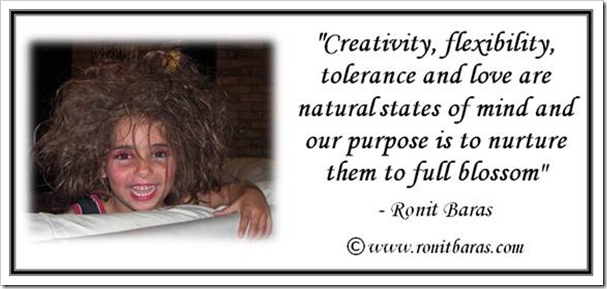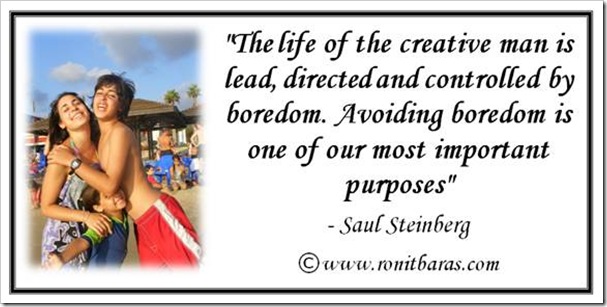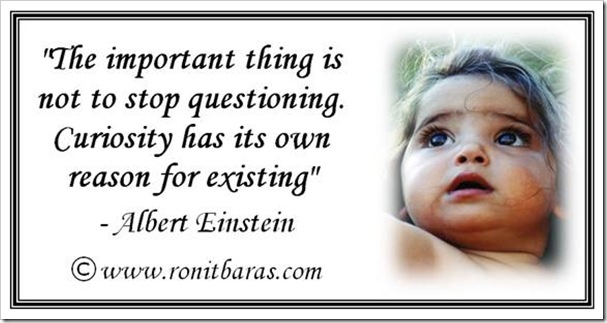In the last three weeks, I wrote ideas to boost creativity in kids. In my opinion, kids already have natural creativity in them and our aim is to nurture it and make sure it does not disappear. In my book, “Be Special, Be Yourself for Teenagers“, I wrote that creativity, along with flexibility and tolerance, are natural states of mind and our job as parents and educators is to nourish them to full blossom.

2 ways to boost your kids’ creativity
Planning
Planning is a good skill for creative kids. It teaches them to be creative with their time management and be efficient with their tasks and ideas. One great way to teach kids to plan in a creative way is to teach them to ask who, what, how, where and when questions.
Planning is asking the right questions before we face the real challenge and requires thinking in a creative way. Considering possibilities is a great way to boost creativity and planning is a suitable platform to practice this. Bear in mind that kids may not be able to think of every possibility initially, but they will get better with time, guidance and practice.
Here are some examples of things you can help your kids plan and the questions they can ask:
- Plan a budget – How much do I want to have? Until when? What for? How will I earn it? Who will help me? Where will I keep my money?
- Plan a party – Who will I invite? When do I want the party to be? When should I send the invitations? How many kids can I invite? Where will the party be? What will be the theme of the party?
- Plan a trip – Where do we want to go? For how long? When is the best time to go? What are we going to take with us? Who can we invite to join us? How much will it cost? What should we take with us?
- Plan a dinner menu – How many people are coming? When are we going to sit down and eat? What do we need to buy ahead of time? What are we going to cook? Who will help? Where are we eating (dining room, balcony)?
- Plan for shopping – What do we need to buy? When is the supermarket open? Who will go shopping? Where is the best place to buy meat/vegetables? How many loaves of bread do we need this week?

- Plan to fix something in the house – What do we need to fix? Where is it? Where is the best place to start? How urgent it is? When is the best time to start? Who is going to help?
- Plan the weekend – What do we want to do on the weekend? Who is already busy this weekend with other activities? Where can we go? When do we want to get up in the morning? How can we prepare ahead so we can get up later? What will the weather be like?
- Plan play time when hosting a friend – Who am I going to invite to play? When? For how long? Where are we going to play? What are we going to play?
- Plan to go camping – What do we need when it gets dark? Where is the flash light? How many meals? Who is coming? How many sleeping bags/plates/chairs do we need? How can we get everything into the car?
- Plan what to wear to school tomorrow – What day of the week is tomorrow? What do I need to wear? Where can I put it? Who knows if my sports shirt is out of the laundry (no, it is not always Mom)?
- Plan what to do in case of fire at home – How do I know there is fire? What do I need to pay attention to? Where do I need to go? Who do I need to call? How do I need to respond?
- Plan what to do when getting lost in the mall – How can I tell I am lost? What do I do? Who (and how) should I call? Who is safe to approach for help? Where do I need to go?
- Plan what to do when in danger – How do I know if I am in danger? What kinds of danger are there? Who do I need to stay away from? Who do I need to call for help (and how)? What can I do to stay safe? Where is it too dangerous to be?
- Plan what to do when talking to a stranger – Who is a stranger? Who is not a stranger? Where (and when) is it safe to talk to people I do not know? What details should I never tell people I do not know? How can I keep myself safe from strangers?
- Plan to bake – What do I want to bake? What do I need? Who is going to eat my cake/cookies? How long will it take? How long does it need to be in the oven? Where is the best place to put it in the oven? Who can help me? What is the first step? How to bake? When is it done?
- Plan to cook – What do I want to cook? What do I need for cooking? Who is going to eat my food? How long will it take? Where is the best place on the stove to use? Who can help me? When is it done? What is the first step? Who is going to wash the dishes (tricky, this one)?
Humor
Humor is a great way to teach kids to be creative with their language. Humor has many benefits in children’s development, in the areas of academic success, social status, emotional growth and even health.
Research has found a correlation between kids’ sense of humor and their creativity. The ability to understand there is more than one meaning to words and expressions helps kids later on with problem solving.
Humor also helps kids socially. Research has found that kids’ sense of humor helps them help others with their problems, making them better friends.

Here are some tips for developing your kids’ sense of humor:
- Use humor in conversation with your kids, tailoring the level to their understanding and adding a little at a time
- Help your kids understand double meaning by discretely explaining
- Help your young kids practice telling jokes. Be patient with them and eventually, they will succeed
- Get books with jokes and riddles from the library and read with your kids
- Expose your kids to funny poetry – this is usually a celebration of language
- Watch comedy shows and movies with your kids, making sure the humor is appropriate for their age
Of course, all these recommendations are good for kids, but they can do wonders for their tense parents, too ;).
Join me next week for another 3 ideas to boost your kids’ creativity.
Happy and creative parenting,
Ronit












